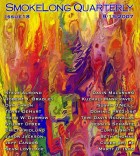Are you the “I” narrator in this piece? How do you feel about writers writing themselves into their fiction?
In general, I’m not particularly into that device: the author as character. I’ve never thought of myself as an especially interesting character for fiction. That being said, I guess you’re right that the “I” actually probably is a very generic version of “Dan Chaon,” which is kind of uncomfortable, now that you bring it up. And the bar is actually a real bar, just down the block from me. Hmm.
Besides Raymond Carver, which late author would you like to meet in a bar?
I’m thinking…shots of Jagermeister with Virginia Woolf. But only if Dorothy Parker was around to be the designated driver.
“‘This feels good!’ he says. ‘Boy, aren’t you glad to be alive?’ And I think for a long while before I nod.” I love this ending. It has this spooky sort of Sixth Sense vibe to it. But it’s the moment that precedes it that I want to take a closer look at. A man and a woman are arguing over a plastic card. It is unclear what the card is. What is clear is the solid nature of their argument, and their existence. For Mr. Carver, who is smoking the narrator’s cigarettes at the bar, acting pensive, what does this incident signify?
I guess I liked the idea of Carver still sharp-eyed and on the lookout for story material. I wanted a sort of miniature Carveresque incident to be happening off to the side.
Your short story collection opens with an epigraph from Raymond Carver, and your own writing has been compared to his. Is it fair to say that he has profoundly influenced who you are as a writer? What is it about this man and his work that inspires you?
I grew up in what I guess could be called a “working class” environment. I was the first person in my family to graduate high school and go to college, and I sometimes felt awkward about the way poor people came across in the stories I read in my classes. Rubes, crackers, lumpen proles. Carver was the first writer I came across who treated these lives with respect. He didn’t try to elevate his hard-luck cases or ennoble the working class or whatever, but he did treat them as if their experience was important. There was the possibility of complexity and mystery, and there was a kind of yearning that I recognized and admired. Years later, I went to graduate school at Syracuse, where he was a teacher. He died the summer right before I arrived. I never met him, and for a long time afterwards I felt a kind of weird, low-grade grief. I suppose there’s a sort of wish-fulfillment at the heart of this story.
Since this is my first issue with SLQ, I thought it’d be appropriate to discuss firsts. Writing firsts. First time you called yourself a writer, first publication, first check. Those sorts of things. So, dish. What is your most memorable writing first?
To me, the most exciting thing has always been the idea that a stranger would actually read my story and remember it. That’s my most memorable “first”: the first time that someone I didn’t know came up to me and said, “I read your book.” Wow, that was an amazing feeling.


